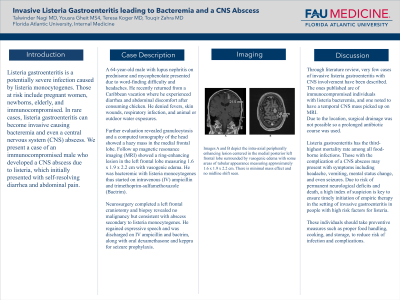Tuesday Poster Session
Category: Colon
P3127 - Invasive Listeria Gastroenteritis Leading to Bacteremia and a CNS Abscess
Tuesday, October 24, 2023
10:30 AM - 4:00 PM PT
Location: Exhibit Hall

Has Audio

Talwinder Nagi, MD
Florida Atlantic University Charles E. Schmidt College of Medicine
Boca Raton, FL
Presenting Author(s)
Talwinder Nagi, MD1, Yousra Gheit, MS1, Teresa Koger, MD2, Touqir Zahra, MD2
1Florida Atlantic University Charles E. Schmidt College of Medicine, Boca Raton, FL; 2Florida Atlantic University, Boca Raton, FL
Introduction: Listeria gastroenteritis is a potentially severe infection caused by listeria monocytogenes. Those at risk include pregnant women, newborns, elderly, and immunocompromised. In rare cases, listeria gastroenteritis can become invasive causing bacteremia and even a central nervous system (CNS) abscess. We present a case of an immunocompromised male who developed a CNS abscess due to listeria, which initially presented with self-resolving diarrhea and abdominal pain.
Case Description/Methods: A 64-year-old male with lupus nephritis on prednisone and mycophenolate presented due to word-finding difficulty and headaches. He recently returned from a Caribbean vacation where he experienced diarrhea and abdominal discomfort after consuming chicken. He denied fevers, skin wounds, respiratory infection, and animal or outdoor water exposures. Further evaluation revealed granulocytosis and a computed tomography of the head showed a hazy mass in the medial frontal lobe. Follow up magnetic resonance imaging (MRI) showed a ring-enhancing lesion in the left frontal lobe measuring 1.6 x 1.9 x 2.2 cm with vasogenic edema. He was bacteremic with listeria monocytogenes thus started on intravenous (IV) ampicillin and trimethoprim-sulfamethoxazole (Bactrim). Neurosurgery completed a left frontal craniotomy and biopsy revealed no malignancy but consistent with abscess secondary to listeria monocytogenes. He regained expressive speech and was discharged on IV ampicillin and bactrim, along with oral dexamethasone and keppra for seizure prophylaxis.
Discussion: Through literature review, very few cases of invasive listeria gastroenteritis with CNS involvement have been described. The ones published are of immunocompromised individuals with listeria bacteremia, and one noted to have a temporal CNS mass picked up on MRI. Due to the location, surgical drainage was not possible so a prolonged antibiotic course was used. Listeria gastroenteritis has the third-highest mortality rate among all food-borne infections. Those with the complication of a CNS abscess may present with symptoms including headache, vomiting, mental status change, and even seizures. Due to risk of permanent neurological deficits and death, a high index of suspicion is key to ensure timely initiation of empiric therapy in the setting of invasive gastroenteritis in people with high risk factors for listeria. These individuals should take preventive measures such as proper food handling, cooking, and storage, to reduce risk of infection and complications.

Disclosures:
Talwinder Nagi, MD1, Yousra Gheit, MS1, Teresa Koger, MD2, Touqir Zahra, MD2. P3127 - Invasive Listeria Gastroenteritis Leading to Bacteremia and a CNS Abscess, ACG 2023 Annual Scientific Meeting Abstracts. Vancouver, BC, Canada: American College of Gastroenterology.
1Florida Atlantic University Charles E. Schmidt College of Medicine, Boca Raton, FL; 2Florida Atlantic University, Boca Raton, FL
Introduction: Listeria gastroenteritis is a potentially severe infection caused by listeria monocytogenes. Those at risk include pregnant women, newborns, elderly, and immunocompromised. In rare cases, listeria gastroenteritis can become invasive causing bacteremia and even a central nervous system (CNS) abscess. We present a case of an immunocompromised male who developed a CNS abscess due to listeria, which initially presented with self-resolving diarrhea and abdominal pain.
Case Description/Methods: A 64-year-old male with lupus nephritis on prednisone and mycophenolate presented due to word-finding difficulty and headaches. He recently returned from a Caribbean vacation where he experienced diarrhea and abdominal discomfort after consuming chicken. He denied fevers, skin wounds, respiratory infection, and animal or outdoor water exposures. Further evaluation revealed granulocytosis and a computed tomography of the head showed a hazy mass in the medial frontal lobe. Follow up magnetic resonance imaging (MRI) showed a ring-enhancing lesion in the left frontal lobe measuring 1.6 x 1.9 x 2.2 cm with vasogenic edema. He was bacteremic with listeria monocytogenes thus started on intravenous (IV) ampicillin and trimethoprim-sulfamethoxazole (Bactrim). Neurosurgery completed a left frontal craniotomy and biopsy revealed no malignancy but consistent with abscess secondary to listeria monocytogenes. He regained expressive speech and was discharged on IV ampicillin and bactrim, along with oral dexamethasone and keppra for seizure prophylaxis.
Discussion: Through literature review, very few cases of invasive listeria gastroenteritis with CNS involvement have been described. The ones published are of immunocompromised individuals with listeria bacteremia, and one noted to have a temporal CNS mass picked up on MRI. Due to the location, surgical drainage was not possible so a prolonged antibiotic course was used. Listeria gastroenteritis has the third-highest mortality rate among all food-borne infections. Those with the complication of a CNS abscess may present with symptoms including headache, vomiting, mental status change, and even seizures. Due to risk of permanent neurological deficits and death, a high index of suspicion is key to ensure timely initiation of empiric therapy in the setting of invasive gastroenteritis in people with high risk factors for listeria. These individuals should take preventive measures such as proper food handling, cooking, and storage, to reduce risk of infection and complications.

Figure: Images A and B depict the intra-axial peripherally enhancing lesion centered in the medial posterior left frontal lobe surrounded by vasogenic edema with some areas of tubular appearance measuring approximately 1.6 x 1.9 x 2.2 cm. There is minimal mass effect and no midline shift seen.
Disclosures:
Talwinder Nagi indicated no relevant financial relationships.
Yousra Gheit indicated no relevant financial relationships.
Teresa Koger indicated no relevant financial relationships.
Touqir Zahra indicated no relevant financial relationships.
Talwinder Nagi, MD1, Yousra Gheit, MS1, Teresa Koger, MD2, Touqir Zahra, MD2. P3127 - Invasive Listeria Gastroenteritis Leading to Bacteremia and a CNS Abscess, ACG 2023 Annual Scientific Meeting Abstracts. Vancouver, BC, Canada: American College of Gastroenterology.
